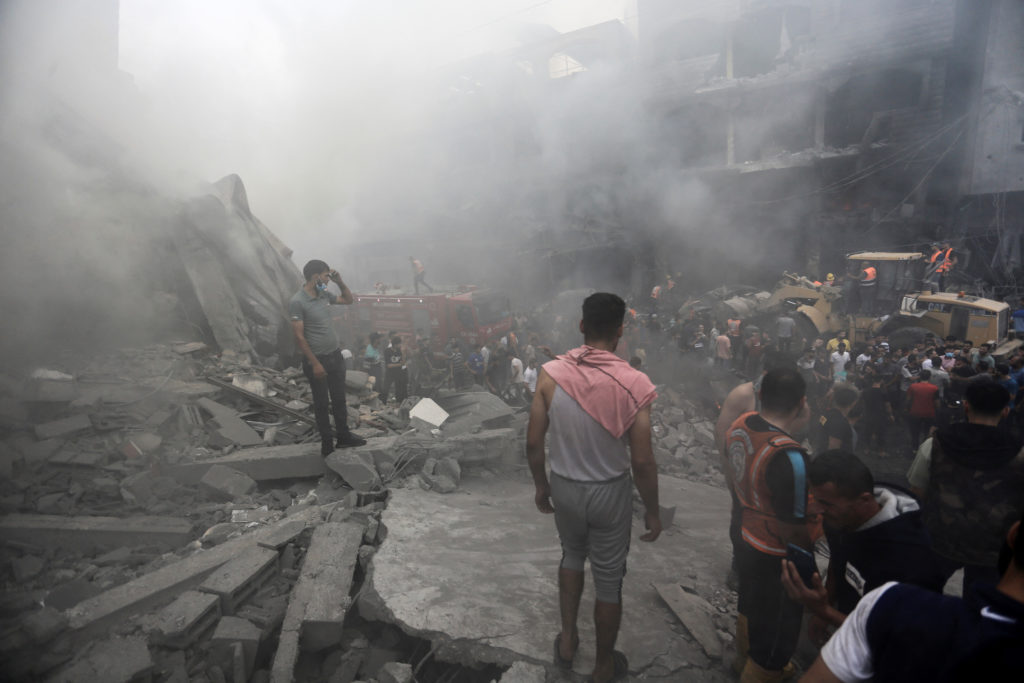The Skeik building, in a quiet road off Omar al-Mukhtar Street in western Gaza City, was a familiar sight to Gaza's lovers. The tree-lined street that ran beside it was once a favourite place for courting couples, eager to avoid Gaza's socially conservative gaze. But the road nicknamed 'Lovers' Street' – and the six-storey building that overlooks it – is now surrounded by rubble. There are few residents left who remember the old days. Those hiding here now are not running from Gaza's disapproval, but from Israeli tanks. Gaza's war has left this once-glitzy neighbourhood in ruins. The smart shops and restaurants running down to the beach are now pockmarked with shrapnel and bullet holes, the park with its French-manicured trees, is buried under grey rubble.
The Skeik building itself is still standing, but its walls are now splattered by shrapnel and a large artillery-sized hole has punched through an upper floor. Its pre-war faces replaced by an ever-changing confetti of displaced people. Two years after Gaza's war began, this one building offers a snapshot of how the conflict has eroded ties to home and community among Gaza's people, and what impact that has had. The previous tenants of the Skeik building are long gone. Above the boarded-up storerooms on the ground floor, eight of the building's 10 apartments have become temporary homes for families displaced by the war.
Hadeel Daban - fourth floor
Twenty-six-year-old Hadeel Daban lives on the fourth floor with her husband and three young children: nine-year-old Judi, six-year-old Murad and two-year-old Mohammad. The family arrived here two months ago, paying 1,000 shekels ($305; £227) a month to camp in the empty rooms. 'The people who were here before us left because it was dangerous,' Hadeel said. 'Shrapnel hits the walls here, but it's still better than a tent.'
The family's few belongings are neatly stashed in piles of bags along the walls. Torn sheets cover the gaping holes where the windows used to be. It's the 12th place the family has moved to. 'When loading our belongings on a cart, I put my children on top of it all and tell them to play with the items, like the kitchen stuff,' Hadeel told me. 'I tell them we're going to live a different life, a bit away from the one we had.'
Hadeel told us her husband, Izz el-Din, was unconscious after being trapped in rubble during an attack. He was treated in a hospital sealed off during military operations which complicated their efforts to reunite.
A home is not just shelter or belongings. And all three families we spoke to in the Skeik building had moved multiple times. 'None of my neighbours are my neighbours anymore, because new people come every month,' Hadeel said.
Muna Shabet - fifth floor
In the apartment above Hadeel's, 59-year-old Muna Amin Shabet plays with her grandchildren beneath large bullet holes punched in the wall. 'Two days ago, bullets hit here, inside the building,' she explained. 'I grabbed the children and ran with them over there, where it's safer. We sat there praying to God that it would be OK. The children were terrified.'
Muna is also from al-Tuffah neighbourhood. She's been living here since August with her husband, three of her children, and her grandchildren. They aren't paying rent. The family lost everything, Muna says, when their home was destroyed weeks into the war.
Shawkat al-Ansari - first floor
It's a feeling Shawkat al-Ansari knows well. Originally from Beit Lahia, now razed to the ground, he told us his mother and sister were sleeping on the street in southern Gaza, while Shawkat lived with his wife and seven children on the first floor of the Skeik building.
Days later, we received a call from Hadeel. She and several other families in the Skeik building were on the move again. Israeli forces had dropped smoke bombs across the area, to signal that they were about to enter. 'We didn't see the tanks last night,' she said, 'but if we don't leave now, we'll wake up to them tomorrow.'
Across Gaza, the buildings left standing have become transit hubs for families, brought together then separated by the war. If negotiations succeed, peace could end their journeys, and reconstruction could bring them a different kind of future. But their old lives are behind them. This war has wiped out the road to the past.



















